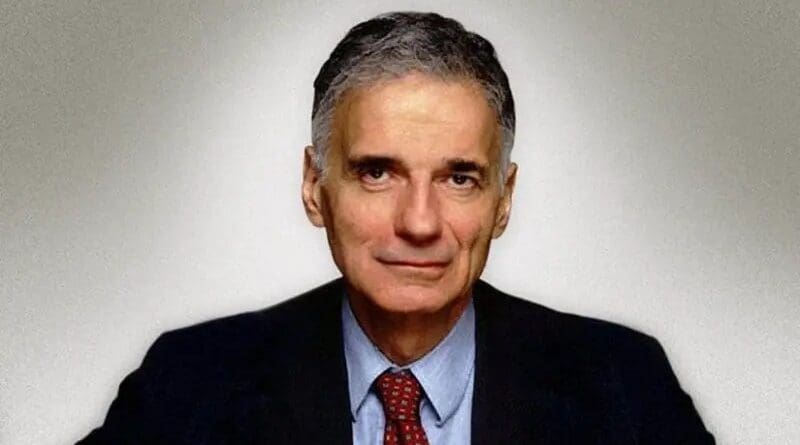Ralph Nader: Apple’s CEO Tim Cook, Serf Labor, Overpriced iPhones, And Wasted Burning Profits – OpEd
By Ralph Nader
The New York Times screamed its Headline— “In 1997, Apple was 90 Days from Going Broke. On Thursday [Aug. 2, 2018], It Became the first publicly traded American company to be valued at…$1,000,000,000,000.” The first trillion dollar company!
The boosters and commentators cheered, adding, “How High Could it Go?” In CEO’s Tim Cook’s announcement, we learned that there were $20 billion more of the shareholders money spent on wasteful stock buybacks. Stock buybacks enable fatter compensation metrics for Apple’s bosses (see Steven Clifford’s The CEO Pay Machine). Corporate managers love stock buybacks.
Earlier this year Apple executives dictatorially announced that it was going to spend $100 billion to buying back its stock, without of course, receiving the owners-shareholders’ approval. The owners might have preferred that some of that amount be used to pay them greater cash dividends. More far-sighted shareholders consider the presumably longer-view: institutional shareholders might have recommended more productive and equitable uses for that vast sum.
Some suggestions: Two billion dollars (a mere 2 percent of that $100 billion) would double the wages of its 1.3 million serf-workers driven to the wall by Apple’s Chinese-based mega-factory contractor. Another two billion would have made major improvements in the global recycling of the present deadly (to the environment and workers) handling of toxic discarded iPhones and computers. Some of that $100 billion could have gone to productive investments, R&D, shoring up Apple’s pension plan, raising wages of Apple’s employees, paying Apple’s fair share of taxes or, consumers take note, lowering the prices of their over-priced phones and components.
Apple’s media cheerleaders can only see blizzards of dollars. They don’t see the damage that this touted “successful business model” is doing to Apple stakeholders.
Exceptionally, Mark Phillips in his page one New York Times story on Apple’s report takes note of the corporate concentration in business profits and markets. “Economists,” he writes, “are starting to look into whether the rise of so-called super-star firms is contributing to the lackluster wage growth, shrinking the middle class and raising income inequality in the United States. The vast social and political influence wielded by their mega-companies has prompted lawmakers to demand more regulation to rein them in.”
Apple’s business model rests on low wage-labor in China and gouging iPhone consumers in the U.S. The federal cops on the corporate antitrust beat have been asleep for years— a somnolence well recognized by Apple, Facebook, Amazon and Google.
Phillips reports “Apple and Google provide the software for 99% of all smartphones. Facebook and Google take 59 cents of every dollar spent on online advertising in the United States. Amazon exerts utter dominance over online shopping and is quickly getting bigger, fast, in areas liking streaming of music and videos.”
The CEOs of these companies behave like “Emperors,” a designation levelled at Exxon/Mobile’s CEO years ago by prominent shareholder advocate Robert Monks at the company’s annual meeting. These new CEOs exude arrogance (sometimes with false Zuckerberg-like public humility). Once they hook their customers, the network costs for customers switching to a competition become higher with time and also serve to discourage any new would-be competitor. Years ago, dominant Hertz rent-a-car had Avis as a competitor. Who are the domestic non-collusive Avis equivalents to the aforementioned Big Four today?
The big institutional shareholders like Vanguard, Fidelity and giant worker pension-funds better wake up. Tim Cook can ignore small shareholder complaints with impunity. The big institutional shareholders, with their skilled staff, can get his attention. They can take a longer, responsible view and demand that he stop burning all their shareholder money with buybacks and give shareholders more in cash dividends and other important investments that produce productive and equitable outcomes.
Concentration of market power in other fields feed the likelihood of future instability through a domino effect. The top five megabanks in the U.S. control about half of the deposits, compared to about one-fifth twenty years ago. Labor’s annual share of the nation’s wealth gains have been declining since the 1990s. Speculation on Wall Street, slowed after the great crash of 2008, is roaring ahead toward the inevitable cliffs of unbridled greed. More taxpayer bailouts?
Grave risk levels are signaling caution; yet incredibly, a Republican Congress and Trump have loosened regulation on Wall Street.
As for you the people, your next big chance to grab hold of Congress and slow down these corporate supremacists comes in November. Do a little homework and find out who is on your side. “Slogan voters” are suckers.

